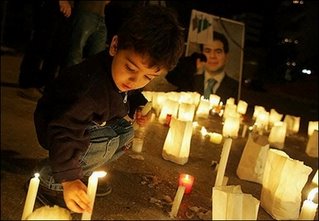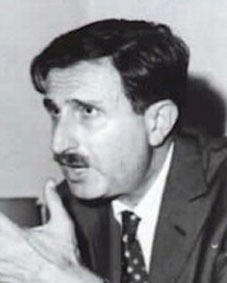By Daniel Williams (dwilliams41@bloomberg.net)
Feb. 13 (Bloomberg) -- In Byblos, an ancient port in Lebanon's Christian heartland, red and white political posters line the streets bearing the portrait of Lebanese army commander and presidential candidate Michel Sleiman.
Sleiman is a Maronite Christian and, under Lebanon's faith- based division of labor, Maronites are guaranteed the presidency. When the system is working, that is. It currently isn't.
A split among Maronites, one subset of Lebanon's fractured political scene, has blocked Sleiman's candidacy. A date for parliament to elect a president has been postponed 14 times since November, when Emile Lahoud stepped down as head of state. The next scheduled attempt is Feb. 26.
``This is very grave because it undermines the ideal of getting along in a system where Christians share in power and administration,'' said Bechara Rai, the Maronite Church bishop of Byblos. ``Christians are losing themselves in the upheaval.''
Maronite divisions have helped prolong an 18-month power struggle between the pro-Western government of Prime Minister Fouad Siniora and Hezbollah, the Shiite party and militia backed by Iran and Syria. The conflict has occasionally ignited street fighting and revived memories of Lebanon's 1975-1990 civil war. On Jan. 27, eight Shiite demonstrators were shot dead in a street battle with police.
The office of the president was last vacant from September 1988 to November 1989, at the tail end of the country's 15-year civil war. The last time before that was 1946.
Geopolitical Stakes
Under Lebanon's Constitution, the prime minister's job belongs to a Sunni Muslim, the parliamentary speaker's to a Shiite. The divisions play into broader geopolitical stakes. Siniora, whose coalition is made up of Sunnis, Christians and the Druze minority, wants to align Lebanon with the U.S. and keep Iran and Syria at arm's length. He favors Sleiman, 59.
Maronites in Siniora's camp include Amin Gemayel, 66, a president in the 1980s, and Samir Geagea, 55, head of the Lebanese Forces, a party with its roots in a militia that fought in the civil war.
Hezbollah's main Christian ally is Michel Aoun, 72, a former army commander who now heads the Free Patriotic Movement and wants the presidency for himself. With the 21 votes of Aoun and his allies, Hezbollah -- which resigned its six cabinet seats in 2006 -- can block the election of a president by not showing up. The 128-seat parliament needs a two-thirds quorum.
Vision
Hezbollah, which triggered a 2006 war with Israel by abducting two Israeli soldiers in a cross-border raid, opposes President George W. Bush's vision of a ``New Middle East'' of Western-oriented allies. As a condition for electing Sleiman, Hezbollah wants veto power in Siniora's cabinet.
Aoun's stand has drawn special scrutiny because, were he to change sides, Hezbollah's opposition to Siniora would be purely ``a Shiite phenomenon,'' Beirut's Daily Star newspaper noted in a Jan. 30 editorial.
Lebanon was created by France after World War I from a patchwork of Christian, Muslim and Druze communities. Power- sharing has distinguished Lebanese politics since independence in 1943; civil-war bloodshed resulted largely from Maronite- Muslim rivalries.
Maronites are Lebanon's largest Christian church. Neither the Lebanese government nor the Maronite church will estimate the actual Maronite population, for fear of highlighting just how much of a minority they now are among the country's 4 million inhabitants.
Guarantee
The U.S. Central Intelligence Agency's latest World Factbook puts the total Christian share of the population, including Greek Orthodox and other denominations, at less than 39 percent. Christians are guaranteed 50 percent of parliament seats, based on the last census taken -- in 1932.
``Whatever the population, it will go down as the crisis goes on,'' said Bishop Rai, 67. ``If we are to survive, solutions must be found.''
Aoun's followers say he is acting in Lebanese and Christian interests. Ibrahim Kanaan, 43, a lawmaker from Aoun's party, says Lebanon can't trust the West and shouldn't take sides between the U.S. on one hand and Iran and Syria on the other. ``We Christians would be broken by getting too close to the West,'' he said.
Aoun said in November that he would give up his claim to the presidency if Hezbollah demands for a Cabinet veto were met and if Sleiman's presidential term was limited to three years instead of the customary six.
`Syria Is Crushing Us'
Nayla Mouawad, 67, the Maronite social affairs minister, says that Syria, not the West, is the problem. ``Syria is crushing us,'' she said. She blames the Syrians for assassinations including that of her husband, Rene Mouawad, in 1989. He had been president for just 18 days.
In the alleys of Byblos, the place where the alphabet was born, residents express dismay and perplexity.
``They should just get on with electing a president; I don't care whose face is on the poster,'' said cosmetics saleswoman Laila Francis, 27, rolling her eyes toward a banner across from her store. ``Just, the Christians need to be represented.''
To contact the reporter on this story: Daniel Williams in Beirut at dwilliams41@bloomberg.net Last Updated: February 12, 2008 17:22 EST

Wednesday, February 13, 2008
Wednesday, January 10, 2007
Labor Union Protests Economic Plan

As if the country can handle more protests. Assuming it does, what is the alternate economic plan? What we see in Lebanon today is opposing one’s views for the sake of just being opposite…
Everything costs money; Yes, rebuilding the country after the civil war drastically increased the dept, but so will rebuilding the country after the latest showdown with Israel (Summer 2006).
Everything costs money; Yes, rebuilding the country after the civil war drastically increased the dept, but so will rebuilding the country after the latest showdown with Israel (Summer 2006).
Many Lebanese are still ignorant to the fact that they (eventually) have to rebuild the country, and citizens pay for government spending with their tax.
When will we grow up, wake up, and smell the coffee (or the deep S**** we are in)…
Friday, November 24, 2006
Thursday, November 23, 2006
Lebanon United in Tragedy
Tuesday, November 21, 2006
Sunday, November 19, 2006
Lebanon unity cabinet or new elections!!!

The calls for early parliamentary elections are democratic, but so are the calls for a new President. Hasn’t Lebanon had enough of destruction and conflict?
I question one party’s decision and monopoly to declare war and demand change at its own leisure and only when it serves its purposes. Am I mistaken, or are we still talking about Lebanon for all Lebanese???
I question one party’s decision and monopoly to declare war and demand change at its own leisure and only when it serves its purposes. Am I mistaken, or are we still talking about Lebanon for all Lebanese???
Sunday, November 12, 2006
Talks collapse in Lebanon

Lebanon was thrown into a political crisis Saturday when talks broke down over giving the militant faction Hezbollah and its political allies greater control of the government. Almost immediately, cabinet ministers from the group and the other main Shiite party resigned...(blah, blah, blah...you can read the rest of the article by clicking the link-header above if you are so interested).
Reading news from Lebanon has truly become a waste of time. Just imagine the worst-case scenario, and more often than not, it happens.
We cannot blame the world for our problems when we cannot agree amongst ourselves. Lebanon allows other countries to dominate its affairs, and Lebanese leaders refuse to compromise.
Is it not time that Lebanese take their heads out of their a****, and see the world for what it really is?
We cannot blame the world for our problems when we cannot agree amongst ourselves. Lebanon allows other countries to dominate its affairs, and Lebanese leaders refuse to compromise.
Is it not time that Lebanese take their heads out of their a****, and see the world for what it really is?
Subscribe to:
Posts (Atom)















